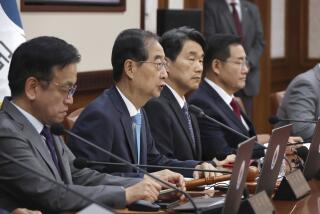Pentagon opens door to resuming the military exercises with South Korea that Trump halted

Reporting from Washington â The U.S. military may resume the large-scale joint exercises with South Korean forces that President Trump halted two months ago, Defense Secretary James N. Mattis said Tuesday, the latest sign that prospects are dimming for an agreement with North Korea on eliminating its nuclear weapons.
âWe have no plans at this time to suspend any more exercises,â Mattis told a Pentagon news conference. He left open the possibility that future drills, including a major annual exercise next spring, could be halted later depending on the nuclear negotiations.
The shift comes days after Trump instructed Secretary of State Michael R. Pompeo to scrub a planned trip to Pyongyang, a setback in the recent thaw between the two adversaries. In a tweet, Trump cited the lack of âsufficientâ progress in the nuclear diplomacy, which has struggled to make headway.
Trump announced a suspension of longstanding joint U.S. military exercises with South Korea as a goodwill gesture after he met with North Korean leader Kim Jong Un in Singapore in June. Trump said he had stopped the âwar gamesâ because they are âvery provocative,â terms used by North Korea in denouncing the drills.
The president said the training exercises would stop âunless and until we see the future negotiationâ on eliminating Pyongyangâs nuclear arsenal âis not going along like it should.â
The U.S. conducts major field exercises with South Korea each year, one in late summer or fall and one in the spring, as well as several other training events, using computer simulations and tabletop war games.
After the Singapore summit, the Pentagon said it was cancelling a major series of drills known as Ulchi Freedom Guardian, which were scheduled for two weeks in August and involved 17,500 U.S. forces.
Trump and Kim agreed at the summit to work toward denuclearization of the Korean peninsula, but their written statement provided no details or timeline. A recent United Nations report found that North Korea was continuing to produce fissile material as nuclear bomb fuel and had not stopped any significant nuclear activities.
Mattis said that decisions on whether to cancel future exercises would depend on progress with Pyongyang. âWeâll make decisions on that in consultationâ with the State Department, he said.
Sen. Marco Rubio (R-Fla.), who often advises Trump on foreign policy, said in a tweet Tuesday that the nuclear talks had failed.
âI never had much hope for talks with #KJU because I knew #NorthKorea wasnât serious about denuclearization,â he wrote. Trump âtook a gamble & bent over backwards to try & find a peaceful resolution. But this effort, like all the ones before, failed, & Kim Jong Un is 100% at fault.â
State Department spokeswoman Heather Nauert said Tuesday that efforts to salvage the nuclear talks are âstill ongoing.â
âThe president is very clear-eyed about the challenges and difficulties that lie ahead,â Nauert said. âSometimes we move forward, and sometimes we stand right where we are.â
âThe fact that we are having talks, I would call that progress,â she said, adding she would âtake exceptionâ with anyone who said otherwise
North Korean state-controlled media has responded to the faltering process by resuming its verbal attacks on the United States after months of positive coverage of Trump.
The U.S. military is plotting to âunleash warâ on North Korea while negotiating âwith a smile on its face,â Rodong Sinmun newspaper, the official mouthpiece of North Koreaâs ruling workerâs party said Sunday. It cited âextremely provocative and dangerousâ U.S. military maneuvers in the region.
Trump had justified his decision to halt the military exercises by saying it would save âa tremendous amount of moneyâ and said he hoped eventually to remove the 28,500 U.S. troops stationed in Korea.
The Pentagon later disclosed that Ulchi Freedom Guardian was expected to cost $14 million, a tiny fraction of the $716-billion defense budget.
Privately, senior military officials warned that the readiness of U.S. forces would be harmed if exercises did not resume by next spring, when a new U.S. commander and new military personnel will have rotated into South Korea.
Pentagon officials long have believed that the yearly exercises deter North Korean aggression and are essential to maintaining readiness given the high annual turnover of U.S. troops in South Korea.
This year, four separate exercises were conducted from early April to late May. One, called Foal Eagle, involved 11,500 U.S. and 290,000 South Korean troops. It was followed by Key Resolve, which used a computer simulation of a possible attack by North Korea to improve headquarters command and control.
Those were followed by Warrior Strike and Max Thunder, the latter an Air Force exercise that originally included sending U.S. bombers from Guam to South Korean airspace. Commanders abandoned that scenario to avoid angering Pyongyang ahead of the summit.
Twitter: @davidcloudLAT
UPDATES:
2:40 p.m.: This story was updated with reaction from Sen. Marco Rubio and a North Korean newspaper.
This story first was published at 8:50 a.m.
More to Read
Sign up for Essential California
The most important California stories and recommendations in your inbox every morning.
You may occasionally receive promotional content from the Los Angeles Times.











